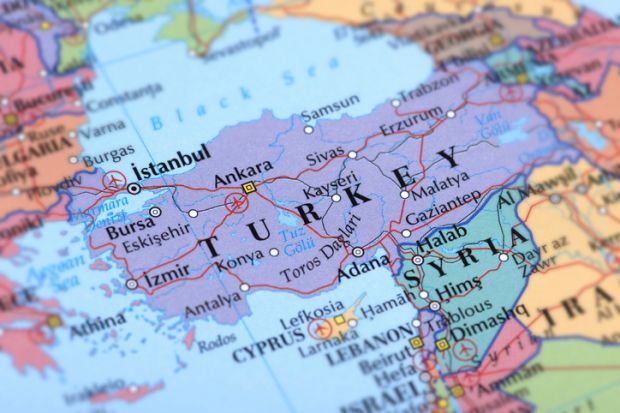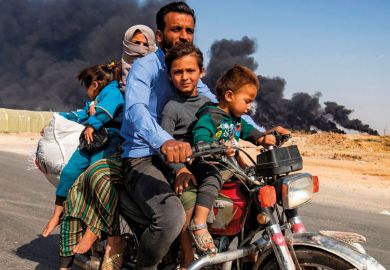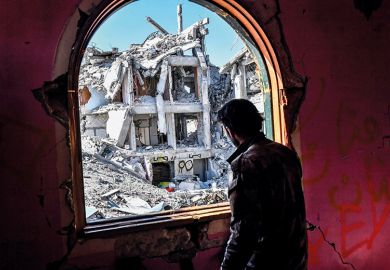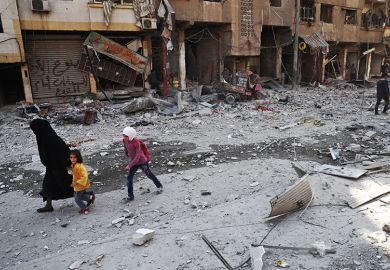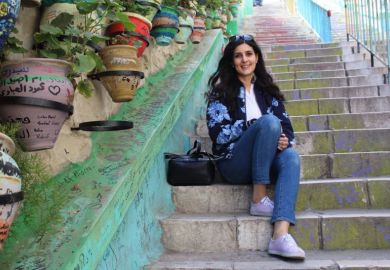Scholars and students in Syria and Turkey have battled to continue the academic year after last month’s earthquake devastated the area, but many remain “haunted” by fears of a second shock.
The Council for At-Risk Academics (Cara), which supports academics exiled by civil war and political repression, is helping displaced Syrian academics living in Turkey who have had their lives and careers thrown into turmoil once again.
The 7.8 magnitude quake on 6 February struck near to the south-eastern Turkish city of Gaziantep, where the majority of Cara’s programme participants are based.
Their lives have been devastated, Cara said. Many scholars are destitute and homeless in the freezing conditions, and nine are still unaccounted for.
Miassar Alhasan, the rector of Sham University in a fought-over area currently under Turkish control, told Times Higher Education that the earthquake had damaged some campus buildings and claimed several students’ lives, while others had been cut off from their families.
Classes, which had already been cancelled at the time of the earthquake because of a snowstorm, were suspended for weeks and exams were scrapped.
Professor Alhasan remained at the site to mobilise staff and students to support the humanitarian response. Praising the university’s efforts, he said chemical engineering students had tested the river water to check that it was safe to drink, while those studying architecture have been surveying the structural integrity of buildings.
“The performance of our student office was outstanding because they collaborated with charities and NGOs to extract the wounded from under the rubble,” Professor Alhasan said. “It’s a very painful thing because we had to facilitate a response, but we had to do that because there is no state or central institution.”
Allowing academics to teach online for a few weeks was not an ideal solution but did reduce risks, said Professor Alhasan, who added that while in-person tutoring had recently restarted, the area still faced dozens of aftershocks every day.
“Some of them [the staff] are calm, but others are only watching their phones for the next aftershock,” he said.
Hanadi Omaish regularly crosses the border to travel between Sham University, near Aleppo, and Gaziantep University to help sustain access to higher education for those who have been internally displaced by the war.
Despite the conflict, she had previously been “very optimistic” for her institution. Now, she worries that a second large earthquake would make life even harder for her students, said Dr Omaish.
“They have been moving from one area to another continuously – they are not as engaged as they used to be,” she said. “They are obviously very anxious because a fear of a second earthquake happening [is] always haunting them – before that, they showed how passionate they were about their education.”
Professor Alhasan, who has worked as a professor since 2010, had already faced huge disruption to his personal and professional life because of the bloody civil war, since 2011. He took some solace from the fact that at least the earthquake was a “natural” event.
The Cara earthquakes appeal has so far raised £140,000, with donations from 13 of the 133 UK universities making up the Cara UK Universities and Research Institutes Network.
Two rounds of hardship fund payments totalling £92,000 have been made to 89 Syrian academics and their dependants, with a third to go out next week.
Register to continue
Why register?
- Registration is free and only takes a moment
- Once registered, you can read 3 articles a month
- Sign up for our newsletter
Subscribe
Or subscribe for unlimited access to:
- Unlimited access to news, views, insights & reviews
- Digital editions
- Digital access to THE’s university and college rankings analysis
Already registered or a current subscriber?
